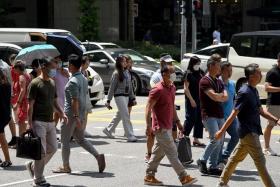Ageism, inclusion of people with disabilities top issues in workplace
Survey of HR leaders shows more work needs to be done to include people with disabilities, older workers
Ageism and inclusion of people with disabilities remain top issues at the workplace in Singapore, a survey of more than 100 human resource (HR) leaders for large companies and small and medium-sized enterprises (SMEs) has shown.
Thirty-eight per cent of respondents in the survey conducted by cloud computing company Workday felt inclusion of people with disabilities was the biggest issue in the workplace.
This was followed by 28 per cent who cited ageism.
Eighteen per cent cited other inclusion issues such as gender diversity and social diversity.
More than half felt their companies did not do enough to support disabled people, while one in four felt older employees faced discrimination.
The lack of facilities for disabled people was the main reason for the majority view.
People with disabilities comprise 0.55 per cent of the resident labour force.
The results were released at a panel discussion yesterday, which included top HR execs from Agoda, KPMG, LinkedIn and Lo & Behold Group.
The panellists cited challenges of bringing these issues into a corporate environment.
They spoke about "unconscious bias" in talent acquisition and the difficulties of justifying "business relevance" of employee diversity. They also discussed steps their companies had taken to improve inclusion.
The inherent bias of people had a lot to do with a fixed mindset, said Ms Merle Chen, chief talent officer at local hospitality company Lo & Behold.
The panel also warned of the dangers of tokenism in trying to force diversity.
The HR officials felt that the two most pressing issues in the hiring and promoting of older employees were outdated skill sets and a lack of aptitude for new technologies.
This was obvious in technology-driven companies like Agoda, an online travel booking platform.
Most of its nearly 4,000 workers tend to be aged 30 and under, said its chief people officer Jeffrey Lee.
He said there was value in including older workers to better reflect customer diversity, saying his younger team had found it difficult to appeal to customers with families.
Mr Lee said older employees with outdated skills should be given opportunities to learn as they work and mentioned SkillsFuture as a useful initiative.
The findings also showed that large companies may find age discrimination to be more of an issue as compared with SMEs.
"The larger an organisation, the more complex its people processes are... It is easier for issues such as ageism to creep in and become amplified... Hence, the need to invest time, resources and technology to improve diversity and inclusion issues," said Mr David Hope, Asia-Pacific president at Workday.
Get The New Paper on your phone with the free TNP app. Download from the Apple App Store or Google Play Store now


